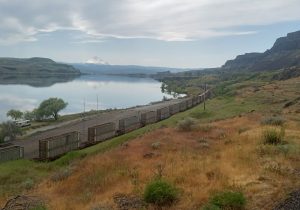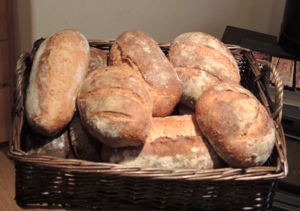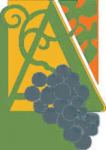lummi island wine tasting april 26-27 ’24
Hours, April 26-27 ’24
OPEN for wine tasting and sales:
Friday 4-6 pm Saturday 3-5 pm

At the moment we are in our trailer at Maryhill State Park on the north shore of the Columbia River.
Over millennia the river has cut a dramatic canyon through the deep basalt built up by Cascade volcanoes. This photo is looking west toward Mt. Hood (from a winery backyard!). By our unofficial count, about 20 120-car trains go each way on each side of the Columbia every day, carrying mostly raw materials west and empty cars east.
At the same time we can look across to the Oregon side and see I-84 running along the river with a steady stream of semis carrying finished products to markets in both directions. Just above us is a steep climb from the nearby bridge to Highway 97, with the frequent sounds of big semis grinding up the half-mile grade in low gear, and the explosive sounds of air brakes on the ones coming down.
Though we have been here many times before, this is the first time we have been so consciously aware of the ongoing sounds of truck and train traffic. It doesn’t change the fact that this is a beautiful and relaxing place, a wide open piece of unique geography.
This visit does, however, strike a resonant note with my training and experience as a resource economist, my research on climate change some 40 years ago at nearby Batelle Labs in Richland, and the fact that my friend Peter just gave me a copy of the book Slow Down: the Degrowth Manifesto, by Kohei Saito. More on that below.
Friday Bread This Week

Buckwheat Rye – Fresh milled buckwheat and rye flours are soaked for several hours without any yeast in a method known as an autolyse. As buckwheat has no gluten and rye has very little, the autolyse allows the grain to start the overnight fermenting process in the refrigerator. The buckwheat-rye soaker is then mixed with bread flour, salt, yeast and a bit of honey. Goes well with all sorts of meats and cheese – $5/loaf
Whole Grain Spelt Sweet Levain – Also made with a levain of freshly milled whole wheat and whole spelt before mixing with bread flour and a nice combination of dried apricots, golden raisins, slivered almonds and both sunflower and flax seeds. Chock full of flavor!– $5/loaf
and pastry this week…
Brioche Almond Buns – Made with a delicious brioche dough full of eggs, butter and sugar. Rolled out and spread with an almond cream filling. The almond cream is not made from pre-made almond paste, but rather is a delicious creamy filling made with lots more butter, sugar and eggs as well as almond flour. Yum, yum – 2/$5
Island Bakery has developed a rotation cycle of several dozen breads and pastries. Each Sunday Janice emails the week’s bread offering to her mailing list. Orders received before 5 pm Tuesday will be available for pickup at the wine shop each Friday from 4:00 – 5:30 pm. Go to Contact us to get on the bread email list.
Economics of the Heart: Climate Change Elephants in Every Room

Slow Down, by Saitō Kōhei, is essentially a refresher course in environmental economics from the viewpoint of a Marxist economist. Lots of people outside the profession don’t know that there are a lot of different specialties in the field, and in particular that there is a bona fide group of modern day Marxist economists called the Union for Radical Political Economics. (URPE)
My experience with these people is that they are particularly bright theoreticians who have long been “onto” the duplicity of the so-called “perfectly competitive model” dating back to Adam Smith a very long time ago, and have developed their own vocabulary for analyzing its many shortcomings.
Years ago I taught a course in “Urban Economics” several times, found the subject fascinating, and learned a lot! I stumbled onto a great textbook, a collection of readings by mostly URPE neo-Marxist economists. One takeaway that has stuck with me all these years is the particular absurdity of expecting markets to sort out fair or efficient resource allocations in the close complexity of any large city…or anywhere else where the distribution of wealth (i.e.,” the ownership of income-earning assets”) is highly skewed to a uber-wealthy minority.
Back in the early fifties, Ronald Reagan hosted a weekly series of video plays called General Electric Theater with the slogan, “Progress is our most important Product.” That progress has been achieved by systematically destroying the environments where these resources were extracted and the global environment upon which the damages from both their extraction and use have fallen.
Since 1980 and Reagan’s deliberate policies of lowering taxes for the rich while reducing assistance for the poor, the crazy, the disabled, and the sick became bedrock of Republican Policy, more guard rails have fallen off in many directions. In particular, under the auspices of “free market forces,” fossil fuel consumption since 1950 has risen 7-fold, from 20,000 terrawatt-hrs to 140,000 TWH. And that is where the carbon that is killing our planet is coming from: a bunch of rich guys in suits sitting around a table willing to destroy all life on Earth for a few more years of personal wealth and power.
The essence of URPE thinking is that there is no such thing as a “perfectly competitive market” in the real world, where market power would be equally divided between producers and consumers. Rather,Kōhei‘s view is that under capitalism the owners of the means of production collect $ every time anyone passes “Go,” while workers only get paid for a day’s labor, and non-pecuniary external costs are exported to the environment rather than mitigated by moderation and due responsibility. These outcomes are the predictable outcomes of unregulated capitalism.
Adam Smith is considered the founder of market economics, in which the Invisible Hand of self-interest “leads everyone to promote the overall good of the society more effectually than when by direct attention.”
But Marx considered that capitalism, i.e., ownership of the means of production by an elite few, would serve only the needs of its owners while at best keeping everyone else at basic subsistence levels, and at worst condemning them to lives of poverty and misery.
to be continued
If you enjoyed this post, please consider to leave a comment or subscribe to the feed and get future articles delivered to your feed reader.

 2072 Granger Way
2072 Granger Way